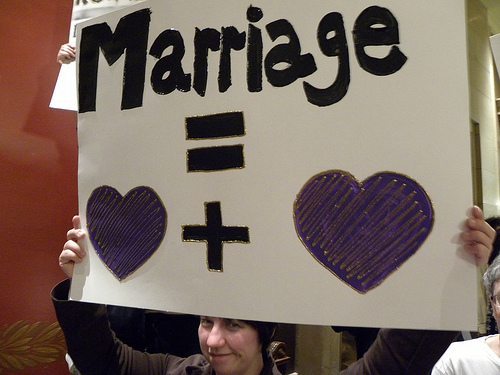Second Circuit Court of Appeals Strikes Defense of Marriage Act in Sweeping Decision
A conservative judge issued a stunning rebuke of the Defense of Marriage Act, teeing the law up for Supreme Court review.

A divided federal appeals court in Manhattan struck down the Defense of Marriage Act as unconstitutional. The Second Circuit Court of Appeals ruling comes only weeks after arguments on the lower court’s ruling the law was unconstitutional.
The ruling came in a case brought by Edith Windsor. She sued the government in November 2010 because she was told to pay $363,053 in federal estate tax after her partner of 44 years, Thea Spyer, died in 2009. They had married in Canada in 2007.
In the 2-to-1 opinion, authored by conservative Chief Judge Dennis Jacobs, is a blistering indictment of the 1996 law and offers a sweeping legal rationale for striking the law that concludes any law that discriminates against the LGBT community should be viewed very skeptically to our Constitution and must be reviewed by a heightened scrutiny. From the opinion:
[W]e conclude that review of Section 3 of DOMA requires heightened scrutiny. The Supreme Court uses certain factors to decide whether a new classification qualifies as a quasi-suspect class. They include: A) whether the class has been historically “subjected to discrimination,”; B) whether the class has a defining characteristic that “frequently bears [a] relation to ability to perform or contribute to society,” C) whether the class exhibits “obvious, immutable, or distinguishing characteristics that define them as a discrete group;” and D) whether the class is “a minority or politically powerless.” Immutability and lack of political power are not strictly necessary factors to identify a suspect class. Nevertheless, immutability and political power are indicative, and we consider them here. In this case, all four factors justify heightened scrutiny: A) homosexuals as a group have historically endured persecution and discrimination; B) homosexuality has no relation to aptitude or ability to contribute to society; C) homosexuals are a discernible group with non-obvious distinguishing characteristics, especially in the subset of those who enter same-sex marriages; and D) the class remains a politically weakened minority.
The standard Jacobs uses in the opinion to strike the law is essentially the same standard used to determine if laws unconstitutionally discriminate against women. This is an important because, it is all but certain the Supreme Court will take up a review of the constitutionality of DOMA next year. Should this legal reasoning by a very conservative judge be persuasive enough for the Supreme Court to adopt it would immediately call into question state laws that discriminate on the basis of sexual orientation.
The Second Circuit Court of Appeals goes farther than the First Circuit Court of Appeals decision out of Boston which declined to apply the heightened scrutiny standard. That means the issue of what level of constitutional scrutiny these kinds of laws must meet is an unsettled matter and all the more likely to require Supreme Court intervention. In the meantime, it is a historic ruling and a sweeping win for equal rights advocates.

